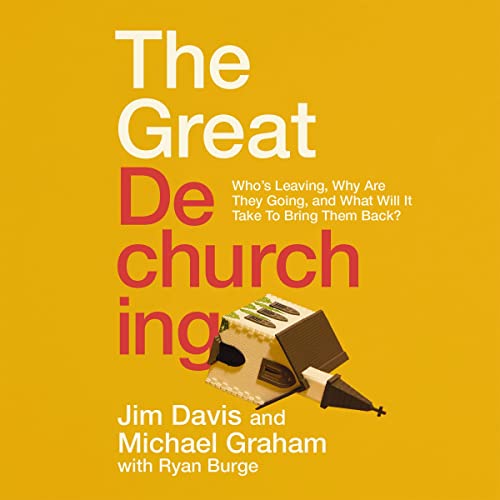Zondervan has just released what promises to be an important book, The Great Dechurching: Who’s Leaving, Why Are They Going, and What Will It Take to Bring Them Back?
Written by a team of researchers consisting of Jim Davis, Michael Graham, and the social scientist frequently cited on this blog Ryan P. Burge, with a Foreword by Collin Hansen, the book purports to offer a “rigorous study” of the dramatic drop-off of church attendance and affiliation in recent years and suggests what might be done about it.
I haven’t read it yet, but in his review of the book for World Magazine, Daniel Darling gives us a taste of the findings and zeroes in on one of the surprises.
Reportedly, over the last 25 years, some 40 million Americans have stopped going to church. Of those, 15 million have left “evangelical” (i.e., conservative Protestant) churches. Of those, 8 million are “cultural Christians” who never took their faith all that seriously and score low on measures of Biblical belief. They do, though, tend to be politically conservative. According to the book, 50% of them would be open to going back to church.
The next biggest cohort consists of 2.5 million believing evangelicals who have just stopped coming to church:
The second largest group of dechurched evangelicals are those who affirm orthodox Christian beliefs but who have stopped attending. It’s not surprising that mainstream evangelicals who no longer attend church still hold mostly right-of-center political views. What is interesting is how many—78 percent—have a high view of the evangelical church, and 100 percent would consider attending again. Many claim to stay home and watch church online. Imagine if churches invited these approximately two and a half million brothers and sisters to return home.
Did you get that? 100%—all of the dechurched Christians surveyed–would be open to coming back to church!
Why have they stopped coming? The reason we keep hearing is that evangelical churches have gotten so political and so Trump-loving, that members are leaving. But the research shows that politics is a negligible factor in the dechurching of America. Yes, there are some “exvangelicals” who have left the church because of politics and disillusionment, but those numbers are small. Actually, conservatives are leaving the church more than liberals. And they are keeping their conservatism even when they leave the church. (The reason for that may be, according to Darling and presumably the book, that the liberals in mainline Protestant congregations have already left.)
For both the nominal and the committed evangelicals who have become dechurched, the reasons are not political, nor are they theological:
Both cultural Christians and mainstream evangelicals share surprisingly pedestrian reasons for leaving. Most admit getting out of the habit, experiencing a major life change, or leaving due to disruptions like COVID. As writer Jake Meador says, “Dechurching for them is either not a big deal because church was never a huge part of their life to begin with or they leave very quietly because they’re actually kind of embarrassed and feel ashamed—not necessarily because of what churchgoers will say, but because some part of them knows they should be going to church—and they don’t want to talk to anyone about it.”
I have suggested that one factor may be that evangelicalism doesn’t have a strong theology of the church anyway. For those who have been taught that faith is just a “personal relationship between me and Jesus” and that all Christians can interpret the Bible for themselves, church is intrinsically optional. Such beliefs may not cause someone to stop going to church, but they certainly give permission to do so.
The book also confirms what I have been saying, that the biggest demographic of the unchurched and the dechurched is the white working class. Darling comments,
One more uncomfortable data point from The Great DeChurching shows that folks without college degrees are leaving much faster than those with education. Put it all together and it could be that in our good and important work to evangelize and disciple the lost to our left, we should also consider ministry to those to our right, the blue-collar, perhaps right-wing people who also need Jesus.
Yea, verily. In tomorrow’s post, I want to raise a different kind of question on this subject that I haven’t seen addressed elsewhere.
Illustration from Amazon.com













